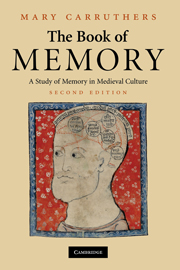Book contents
- Frontmatter
- Contents
- List of Illustrations
- Preface to the second edition
- List of Abbreviations
- Introduction
- CHAPTER 1 Models for the memory
- CHAPTER 2 Descriptions of the neuropsychology of memory
- CHAPTER 3 Elementary memory design
- CHAPTER 4 The arts of memory
- CHAPTER 5 Memory and the ethics of reading
- CHAPTER 6 Memory and authority
- CHAPTER 7 Memory and the book
- Appendix A
- Appendix B
- Appendix C
- Notes
- Bibliography
- Index of manuscripts
- General Index
CHAPTER 4 - The arts of memory
Published online by Cambridge University Press: 05 January 2014
- Frontmatter
- Contents
- List of Illustrations
- Preface to the second edition
- List of Abbreviations
- Introduction
- CHAPTER 1 Models for the memory
- CHAPTER 2 Descriptions of the neuropsychology of memory
- CHAPTER 3 Elementary memory design
- CHAPTER 4 The arts of memory
- CHAPTER 5 Memory and the ethics of reading
- CHAPTER 6 Memory and authority
- CHAPTER 7 Memory and the book
- Appendix A
- Appendix B
- Appendix C
- Notes
- Bibliography
- Index of manuscripts
- General Index
Summary
The mnemonic techniques that I have described so far are basic, their elementary nature attested by their ubiquity. Divisio and compositio are processes required by the physiology of memory itself, at least as the pre-modern world understood it. But it is important to keep in mind that in considering medieval memoria we are dealing with more than just a set of techniques or a descriptive psychology, yet also a more specifically realized value than ghostly ideas (like “the Gothic”) which modern students have attached to some philosophy or other, or to a metahistorical mentalité. From antiquity, memoria was fully institutionalized in education, and like all vital practices it was adapted continuously to circumstances of history. Memoria unites written with oral transmission, eye with ear, and helps to account for the highly mixed oral–literate nature of medieval cultures, which many historians of the subject have remarked. Yet it is also clear that the later Middle Ages, from the eleventh century onward, was a far more bookish culture than the earlier medieval centuries had been. Memoria was adapted to that change, without – as a set of practices – losing its central place in medieval ethical life. In this chapter I will focus on this change by considering the revival in the thirteenth century of the Herennian architectural mnemonic which I described in Chapter 2.
- Type
- Chapter
- Information
- The Book of MemoryA Study of Memory in Medieval Culture, pp. 153 - 194Publisher: Cambridge University PressPrint publication year: 2008

